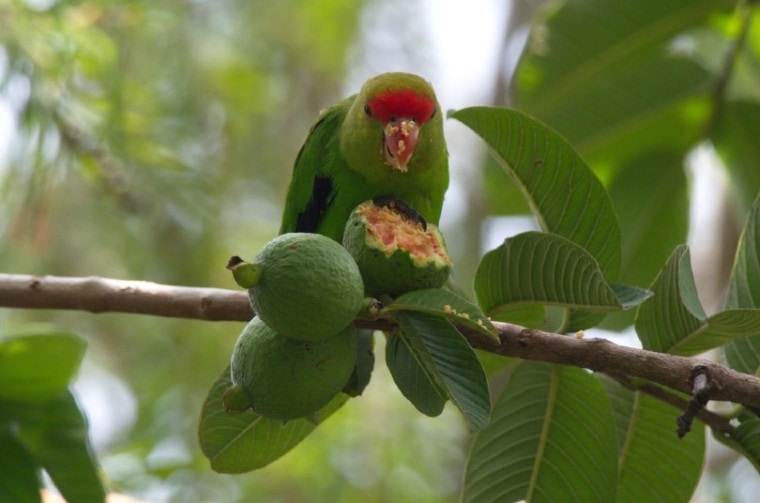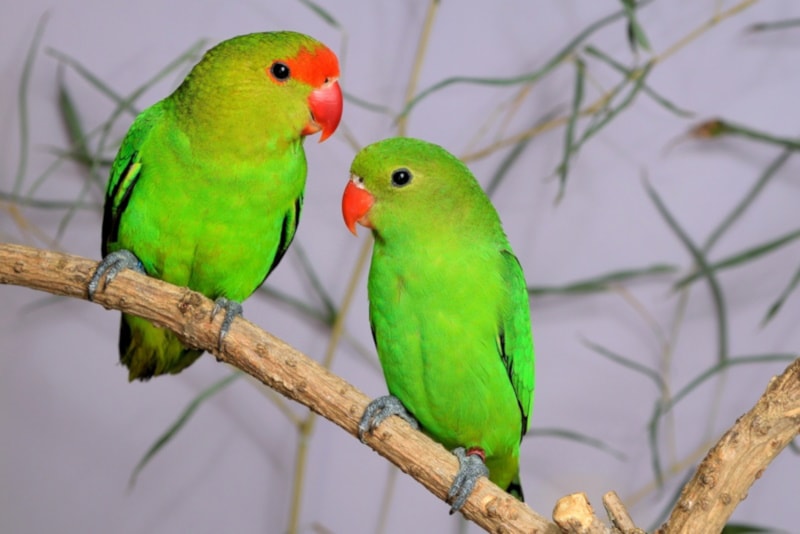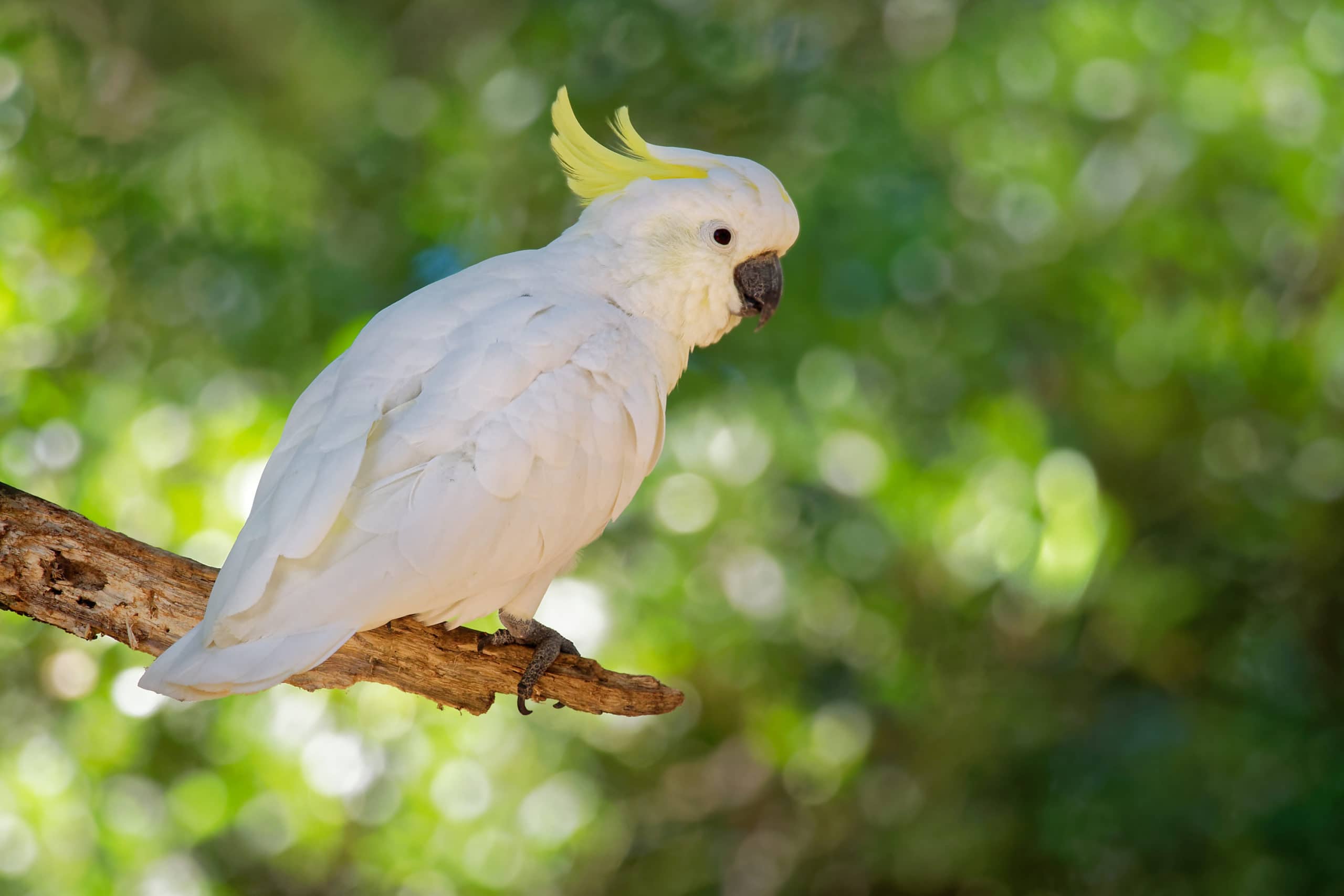
As part of the parrot family, the Black-Winged (or Abyssinian) Lovebird is typically green in color, with males sporting a red forehead. Their name is derived from the fact that they all have black outlines along the edges of their wings. These birds come from places in Africa such as Ethiopia and are not as commonly kept as pets, like how other types of parrots and Lovebirds are.
The breed is one of the largest of existing Lovebird types yet is also one of the smallest of the parrot species. These Lovebirds usually stay within small packs of up to 20 and tend to live as high up as 10,000 feet above sea level in the wild. We have put together a comprehensive guide for you here that covers everything from the Black-Winged Lovebird’s personality to their care requirements when living in captivity. Keep reading to learn more!
Species Overview
| Common Names: | Black-Winged Lovebird, Abyssinian Lovebird |
| Scientific Name: | Agapornis taranta |
| Adult Size: | 6 – 7 inches in length |
| Life Expectancy: | 20 – 30 years |
Origin and History
These beautiful Lovebirds originated in Africa, where they enjoy living in high altitudes for the most part. Most still live in the African wild, but some are now domesticated and kept as pets throughout the rest of the world today. These birds are believed to have been first discovered in the early 1800s and are considered to be one of the most resilient of the Lovebird species in existence.
Unfortunately, there is not much known about this breed of Lovebird. We do know that they’re one of the largest Lovebird breeds out there, and they make great pets if you can find one for sale in your area. Here is what else you should know about the Black-Winged Lovebird.
Temperament
Black-Winged Lovebirds are extremely social creatures and are not happy when living without at least one other Lovebird around. These birds spend much of their time throughout the day preening each other. However, they’re known to become aggressive when sharing tight spaces with other Lovebirds, so they need plenty of room within their habitat to maintain a healthy, happy, and conflict-free life.
These Lovebirds are also highly active and enjoy flying from tree limb to tree limb as they move. Their curious nature keeps them busy doing things like uncovering what’s underneath fallen leaves and picking at weeds. In captivity, they require toys to replace the natural stimulation that they would get in the wild.
Speech & Vocalizations
These Lovebirds do not typically talk, although they can physically do so if they want to. Some mimic sounds like whistling and horn honking, but rarely will you meet a Black-Winged Lovebird that speaks actual words. However, most Lovebirds do sing and make noises throughout the day, especially when interacting with other Lovebirds. Therefore, you will likely hear them tweet, hum, and chirp regularly, especially during sunlight hours.

Black-winged Lovebird Colors and Markings
All Black-Winged Lovebirds have bodies full of green feathers. Females are completely green, aside from the black lining on their tails and wings. Males have red feathers on their foreheads and around their eyes. Sometimes, slightly yellow coloring can be found on the bottom tail feathers. There are no major color variations to note, so you can expect any of these Lovebirds that you meet to look about the same.
Caring for the Black-Winged Lovebird
This species of Lovebird is not for the beginning pet owner. They require tons of care and attention, and they are not happy unless there is more than one of them living in the same habitat, which means more work for their human companions overall. The Black-Winged Lovebird requires plenty of space to fly and play in, so their habitat should provide at least 4 feet of space widthwise and 3 feet of space height-wise per bird living within it.
Inside the habitat should be a clean bowl of water to drink out of and bathe in and a food dish that gets filled daily with foods such as seeds, fruits, grasses, and berries. In addition, the habitat should have toys like mirrors and wooden blocks and faux tree branches to fly between and hang out on.
These birds are not happy unless they can stretch their wings and fly, so they should be let out of their caged habitats regularly for air flight inside the house. This can be done in a small space, like the bathroom, or in a major area, like the living room. However, all windows and doors should be closed during free time to prevent an escape.
Common Health Problems
There are a few health conditions and potential problems to consider when it comes to caring for a Black-Winged Lovebird. First, boredom and a lack of space can result in self-mutilation and serious wounds as time goes on. These birds are also susceptible to the development of respiratory infections, abnormal dropping, feather loss, and chlamydiosis.
The best way to keep a Black-Winged Lovebird safe and healthy is to provide them with a clean, dry habitat to live in, give them plenty of opportunity for play and exercise, and feed them a proper diet that meets all their nutritional needs every day. Regular checkups with the veterinarian help identify and treat health problems before they become too serious.
Diet and Nutrition
In the wild, Black-Winged Lovebirds eat various things, including grass seeds, leaves, and different types of bugs and worms. In captivity, it can be tough to mimic a wild diet. However, there are commercial foods on the market made specifically for these birds that include all the nutrients necessary for good health, such as sunflower seeds, millet, peas, carrots, and raisins.
Black-Winged Lovebirds should receive both commercial food and fresh food from the kitchen every day. Lettuce pieces, melon, bananas, pineapple, papaya, berries, peanuts, and brown rice are all awesome snack options to consider. Fresh, clean water should be offered at all times.
Exercise
These are not sedentary birds by any means. They need room to move, fly, play, and clean themselves. But your pet Lovebird will not be happy without regular flights around the house. This is key because flying is the only kind of effective exercise available to them, and flying in a small cage will not cut it. You can attach the bird to one end of a light tether and hold the other end in your hand to ensure safety and keep the bird from flying where you do not want them to go.
Where to Adopt or Buy a Black-Winged Lovebird
The Black-Winged Lovebird is rare in captivity, so they are not easy to find on the market. You can check local pet shops and Lovebird breeders for them. The humane society and other animal rescue centers may occasionally have a Black-Winged Lovebird available for adoption. Some private families may also be looking to adopt their Lovebirds out to others for any number of reasons. Basically, expect to do a little legwork when it comes to searching for one of the birds to purchase or adopt.
Final Thoughts
These beautiful little Lovebirds are social, interactive, and fun to spend time with. Unfortunately, they are not commonly kept as pets, so most people only ever get to read about and see pictures of them. If you are serious about owning a Black-Winged Lovebird, spend time making calls to various organizations and groups each week, as you never know when a bird will become available. When one does, you can bet that they will go fast!
You may also want to read:
Featured Image Credit: Tristan Barrington, Shutterstock








